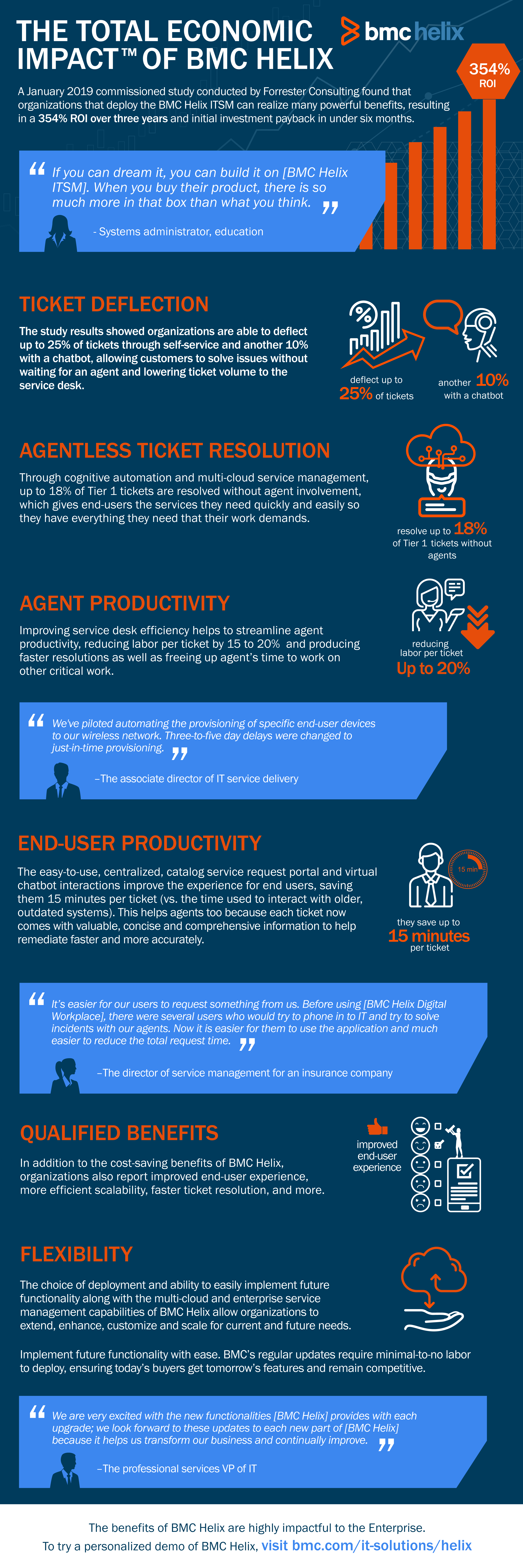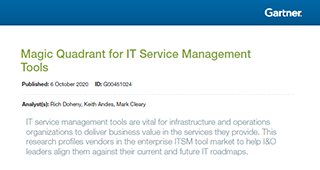It’s no secret that enterprise technology is rapidly evolving. Though the pace of change may not match that of consumer-facing goods and services, the fact is that digital transformation is disrupting the way that organizations achieve key business goals every day. Customers are expecting more speed, more convenience, and more personalization, especially when it comes to submitting service requests, and traditional IT service management (ITSM) is unable to keep up. It’s time for the next step in ITSM.
Cognitive service management, or CSM, is the solution to this digital disruption. Cognitive technologies such as AI, machine learning, robotic process automation, virtual agents, and chatbots are simultaneously raising customer expectations and businesses’ ability to deliver. Organizations that resist the call of cognitive tech risk falling behind the competition and missing out on their true service management potential. Fortunately, BMC Helix makes the transition to CSM a smooth one.
Below, we’ll take a look at six key ways that cognitive service management with BMC Helix is directly benefiting organizations around the globe. First, we’ll dive into what is driving digital transformation, and why traditional ITSM is not enough.
Rising Customer Expectations
Personalized customer experiences have become the new norm, to the point where consumers may not even be aware whether their experience is personalized. All they know is that a business interaction is either relevant or it’s not. Targeted content has applications across not only marketing and sales, but service management as well. Empowered with customer data, service agents — either virtual or human — can supply the right solutions at the right time.
In the past, service agents relied on manual processes such as notetaking and bucket systems to meet the unique needs of customers. Today, AI-driven self-service platforms and chatbots enable customers to resolve their specific issues without having to wait for an agent. In addition, agents are supplied with concise information about tickets, so they can more effectively meet the rising expectations of customers.
Evolving Agent Protocol
Cognitive technology is providing service agents with the tools to deflect Tier 1 tickets and focus on addressing more demanding customer needs. Chatbots can get ticket information, provide helpful resources, and route the customer to the appropriate agent, all without leaving the conversation. Across devices, agents can access the information they need and remediate in more efficient ways. These are just a few examples of BMC Helix’s cognitive capabilities in action.
Tangible and Intangible Benefits
Deploying cognitive technology doesn’t just result in improved agent and customer experiences — there is a tangible, enterprise-wide return on investment. As we’ll see in the infographic below, organizations that deploy BMC Helix can find a 354% ROI over three years, according to Forrester Consulting. To find out what your enterprise’s ROI could be, use the Total Economic Impact Estimator for BMC Helix.
The intangible benefits of BMC Helix are far reaching, but can be boiled down to two points: happier agents and happier customers. Many of the elements which contribute to tangible savings — such as agentless ticket resolution — also result in an improved experience for both customers and agents. When agents save time through automation, customers are served faster and your business saves money.
Ready to discover more of the benefits driving the cognitive enterprise with BMC Helix ? Check out the infographic below:








